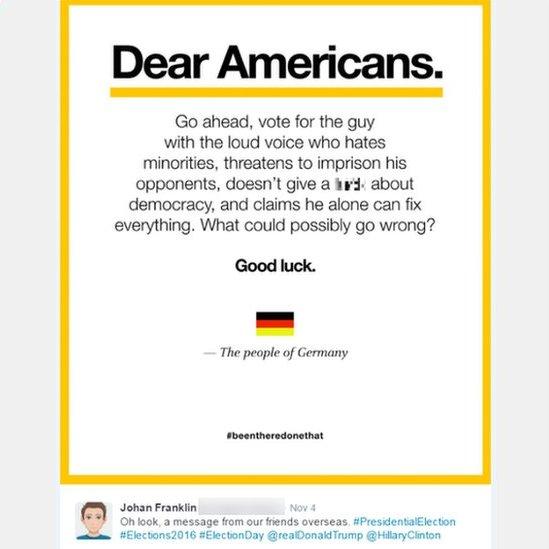German Citizen Sparks Controversy by Comparing Trump’s Campaign to Hitler’s Regime
In a provocative statement that quickly spread across social media, a man named Johan Franklin compared the campaign of U.S. presidential candidate Donald Trump to Adolf Hitler’s rise to power in the 1930s. The German IT consultant, currently residing in San Diego, California, expressed his concerns in a message addressed to Americans, claiming to speak on behalf of “the people of Germany.” This message posed a rhetorical question: “What could possibly go wrong?” and highlighted Trump’s authoritarian tendencies, including threats to imprison opponents. The post, tagged with the hashtag #beentheredonethat, went viral within hours.
Aiming for Civil Discourse
In an interview with the BBC, Franklin defended his bold comparison, acknowledging its crude nature. “I know the Hitler comparison was pretty crude,” he remarked. However, he explained that his focus was not solely on Trump but rather on the alarming similarities he perceived in how political figures amass support. “The way he gathers people around him, regardless of what he says or does, is scary,” he said.
Franklin’s comparison was fueled by conversations he had with Trump’s supporters, which triggered memories of discussions his grandparents had shared about the Nazi regime in Germany during the 1930s. “Whenever I traveled outside Germany, people often asked how the German population could have fallen for Hitler. I don’t get that question as much nowadays,” he mused.
Mixed Reactions to the Controversy
The response to Franklin’s message was polarized. Many Twitter users criticized his inflammatory language, with one user, Mick Flugennock, commenting, “Yeah, yeah, I know, I know; Trump is Hitler.” Another respondent took issue with his self-appointed role as a spokesperson for the German people. Supporters of Clinton who shared the post emphasized its significance with comments like, “Remember this as we head to the polls tomorrow.”
Despite the backlash, Franklin noted that his letter did spark a much-needed discussion about the tone and nature of the current political climate in the United States. “There was a lot of hate in this election, and the reactions on social media reflect that,” he said. “If there was a ‘kill that person instantly’ button on Twitter, I believe some would use it.”
The Impact of Online Commentary
In the wake of his initial post, Franklin received both criticism and support. He acknowledged the threats he encountered but emphasized the positive discourse that also emerged. “I received messages from individuals who shared similar worries but felt too afraid to voice their concerns,” he remarked.
Franklin’s childhood experiences, informed by stories of his grandparents’ collective guilt over their inability to stop Hitler, play a crucial role in his perspective. “They felt powerless to change the tide, and that weighs heavily on us,” he said. “We often think we didn’t know, but in retrospect, there were signs everywhere.”
Table of Reactions to Franklin’s Comparison
| Reaction Type | Comment |
|---|---|
| Criticism | “Yeah, yeah, I know, I know; Trump is Hitler.” |
| Support | “Remember this as we head to the polls tomorrow.” |
| Concerns | “How could your people not have known?” |
Franklin’s concerns reflect a broader unease surrounding political discourse in America, and while he acknowledges the challenges in changing minds, he remains hopeful that his message can encourage open dialogue about the issues at stake in the upcoming election.

